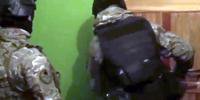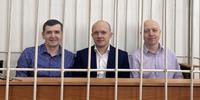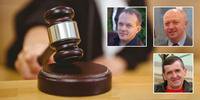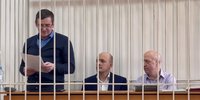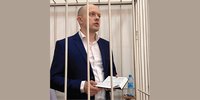The Case of Korolev and Others in Akhtubinsk
Filter
- #
At 5 a.m., the investigator of the Akhtuba Interdistrict Investigation Department of the Investigative Directorate of the Investigative Committee of the Russian Federation for the Astrakhan Region, Sergey Savinich, opened a criminal case against three believers: Sergey Korolev, Rinat Kiramov and Sergey Kosyanenko. Within a couple of hours, searches are being carried out at at least 15 addresses in Akhtubinsk and Znamensk.
Investigative actions last from 4 to 10 hours. Telephones, personal records, information carriers and printed publications are seized from believers. Law enforcement officers interrogate at least 15 citizens and make audio recordings of the voices of some of them for later identification.
Having knocked on Rinat Kiramov's door, the security forces introduce themselves as neighbors, whom the spouses allegedly flood. Then they break down the door and order the Kiramov family and their guests to lie on the floor. One of them had to remain in this position for more than an hour. Phones, passports and car keys are seized from Kiramov's friends. The security forces open the ceiling in the kitchen, as a result of which its suspension system falls, break the dishes and partially dismantle the panels of the balcony cladding. Law enforcement officers take away all those present for interrogation. Copies of the protocols are not provided to the guests of the Kiramovs, citing the fact that the official search did not take place at their place.
During a search in the Korolevs' house, Sergey's wife's blood pressure rises sharply. One of the law enforcement officers tries to calm her down. The spouses are allowed to have breakfast before taking them away for interrogation. According to the investigator, the believers were monitored and wiretapped. After interrogation, Sergey Korolev is placed in a temporary detention facility.
After a search in another house, the security forces take away for questioning a mother and son, a hearing impaired person of group III. He is experiencing a strong emotional shock, as he cannot hear the investigator well, and he is not provided with a sign language interpreter.
Investigators prevent believers from exercising their right not to testify against themselves and their loved ones, interpreting the use of Article 51 of the Constitution of the Russian Federation as a refusal to testify.
- #
The Akhtubinsk District Court elects a measure of restraint for Sergey Korolev in the form of detention until January 9, 2022.
- #
Sergey Korolev, Rinat Kiramov and Sergey Kosyanenko are elected a measure of restraint in the form of detention. Three believers are sent to pre-trial detention center No. 1 in the Astrakhan region.
- #
Investigator Savinich initiates another criminal case against three believers under Part 1 of Article 282.3 of the Criminal Code of the Russian Federation (financing the activities of an extremist organization). Later, he combines it into one proceeding with the case previously initiated against Korolev, Kiramov and Kosyanenko.
- #
The case goes to the Akhtubinsky District Court of the Astrakhan Region.
- #
The Akhtuba District Court extends the period of detention of believers until April 27, 2023.
- #
The Astrakhan Regional Court upholds the decision to extend the period of detention of believers, reducing it by only 1 day - until April 26, 2023.
- #
The challenge to the judge filed by the defense remains unsatisfied.
The prosecutor announces the indictment and proceeds to the examination of the case materials.
- #
On December 5 and 7, Sergey Kosyanenko is present only at part of the hearings for health reasons - he is being provided with emergency medical care in the temporary detention facility. On December 8, doctors were summoned to the courthouse - Sergey Kosyanenko became ill at the hearing.
Prosecution witnesses are questioned at the hearing. The first of them says that he does not know the defendants, only Rinat Kiramov "met a couple of times on the street." The prosecutor reads out part of the preliminary testimony of the witness, where it is said that he is familiar with the defendants and calls them "organizers". The witness insists that he did not give the testimony assigned to him and reports that he signed the protocol without reading, as he was interrogated without glasses.
Another witness uses Article 51 of the Constitution of the Russian Federation and confirms his preliminary testimony.
The defense objects to the fact that the prosecutor does not allow the wives of the defendants into the courtroom. The judge does not allow the prosecutor to challenge.
The state prosecutor continues to read out the case materials.
- #
Sergei Korolev's wife, Ekaterina, is being interrogated. She gives a positive characteristic to her husband. When answering most of the prosecutor's questions, he uses Article 51 of the Constitution of the Russian Federation.
- #
At the court session, a secret witness is being interrogated - a man with whom Rinat Kiramov talked about the Bible. The man considers the religion of Jehovah's Witnesses to be prohibited in Russia. At the same time, he says that the believers did not carry out extremist activities. The witness partially refutes the testimony he gave during the preliminary investigation.
- #
The announcement of the written materials of the case continues. A man who previously professed the religion of Jehovah's Witnesses is being interrogated. He does not say anything bad about believers and does not confirm most of the testimony given earlier.
- #
Another witness is being interrogated. He confirms his preliminary testimony.
Next, the defense presents evidence. The wives of the defendants Kiramov and Kosyanenko, as well as Kiramov's mother, are being interrogated. They give their relatives extremely positive characteristics.
- #
At the initiative of the prosecution, E. V. Shtanko, who communicated with believers, pretending to be interested in the Bible and collaborated with law enforcement agencies, is being interrogated. The woman does not hide her hostility to the religion of Jehovah's Witnesses. Her testimony has nothing to do with the charges against the defendants.
Witnesses of the defense are being interrogated, who give a good description of Sergey Kosyanenko.
- #
The defense presents its evidence. Defense witnesses are being interrogated, who give a good description of Rinat Kiramov, Rinat and Sergey Korolev.
- #
The defendants testify to the court.
- #
The prosecutor asks to appoint each of the believers to 8 years in a general regime colony, to deprive them of the right to lead public organizations and participate in their work for 4 years, as well as to impose additional restrictions on freedom for 2 years.
All the defendants make their final statements. At the next hearing, the court will announce the verdict.
The last word of the defendant Rinat Kiramov in Akhtubinsk The last word of the defendant Sergey Korolev in Akhtubinsk The last word of the defendant Sergey Kosyanenko in Akhtubinsk - #
- #
- #
Sergey Korolev, Rinat Kiramov and Sergey Kosyanenko are transferred from the Astrakhan pre-trial detention center No. 1 to a correctional colony.
- #
Sergei Korolev arrives at the colony. During the transit, he is interrogated by the staff of the Center for Countering Extremism.
Sergey Kosyanenko is taken to Penal Colony No. 6 in the Moscow Region, located in the city of Kolomna, to serve his sentence. He can write letters.
- #
In the barracks where Korolev is kept, there are another 40 people. The conditions are normal, Sergey feels good. He has a Bible. In his spare time, he studies English and does gymnastics.
The cellmates were surprised to learn that Yekaterina, Sergey's wife, had moved almost 700 kilometers to be closer to her husband.
- #
Rinat Kiramov is taken to correctional colony No. 6 in the Tula region in the city of Novomoskovsk. Upon arrival, the believer is quarantined.
- #
Kiramov has good relations with the administration and other prisoners. He works as a baker, while mastering this profession. The believer is treated kindly, he tries to work conscientiously.
Rinat has a Bible, and he has already received several letters and a parcel from relatives.
- #
Sergei Korolev is being held in the barracks along with 30 other prisoners. The believer has a normal relationship with them. There are no problems with the administration either.
Sergey works in a machine shop, sawing metal on a machine. He regularly receives letters of support and tries to respond to them. The believer has the opportunity to read the Bible.
Korolev also regularly receives parcels from his wife. This supports Sergey emotionally. The couple were allowed a long visit.
- #
- #
- #
Sergey Kosyanenko misses his family. Since he is located 1300 km from home, it is difficult for his relatives to visit him often. The believer works and actively participates in events organized by the colony: quizzes, chess tournaments, sports competitions and the design of wall newspapers.
- #
Sergei Korolev is in the barracks with about 50 prisoners. He tries not to lose his spirits. He is very supported by letters from friends and the opportunity to have long visits with his wife. Relations with the administration of the colony and other prisoners are good.
- #
The administration of the colony forbade Rinat Kiramov to work and study. He wanted to get the profession of a welder, but he was expelled from the group. The ban was imposed after the believer returned from the LIU, where he was tortured. Kiramov is periodically searched and interrogated. The Bible, which was seized in September, was not returned to him.
- #
Rinat Kiramov lives in a barrack where 63 people are kept. Overall, it has everything you need for life. At the moment, Rinat is performing the duties of a day worker. He again applied to become a welder.
After the seizure, Rinat was never returned the Bible.
The believer regularly receives letters of support from friends and family, which helps him maintain a good mood.
- #
The administration repeatedly cancels Rinat's long visits with his wife, approved by the head of the colony. And every time at the last moment, when Galina already arrives at the colony.
During another search, Rinat was deprived of his Bible for the fifth time - the only copy in the colony, previously kept in the church. The book was published in 1939 by pastor Bolesław Göce, has the stamp of the local library and is approved by the censor. The believer is determined to defend his right to read the Bible, even to the point of filing a complaint with the prosecutor's office. In response, law enforcement officers threaten him with worsening conditions of detention.
- #
Rinat still manages to get a long date with his wife. He is in a good mood. Prior to that, the believer had been ill with SARS for a long time, but at the moment the disease has receded.
- #
Sergey Kosyanenko was rewarded for his hard work the sewing workshop. At the request of the administration, Sergey painted a design on one of the walls of the penal colony. In his spare time, he paints for other prisoners.
The premises where Sergey is kept is warm, has a refrigerator and a TV. Since staying in the penal colony, Sergey has developed a cough. He links this to the tobacco smoke that gets into the barracks.
The believer receives letters weekly, although after censoring he receives some of them only in part. He also has the opportunity to read the Bible. Regular telephone conversations with his wife greatly support Kosyanenko.
- #
Rinat had a long date with his wife Galina. His detachment now has 84 people. The believer still performs the duties of a day guard: he cleans some rooms, announces lights out and wakes up, and conducts exercises for the entire barracks. Other prisoners treat Rinat with respect and note his calm and friendly nature.
- #
At the moment, there are 37 people in the barracks where Sergei Korolev is being held. In the workplace, he has proven himself on the positive side, performs serious projects and enjoys the respect of colleagues. He tries to fully rest, as much as possible in the conditions of imprisonment, and take care of his health.
- #
At the end of October, Rinat Kiramov gets an extended visit from his wife. Before the visit, his Bible was again taken away from him, and he had to turn to the local church for a new copy. A deep study of the Holy Scriptures helps the believer to remain steadfast and support his wife long-distance. He is also strengthened by letters from friends who have been following his life in the pretrial detention center and penal colony for more than 4 years.
In mid-November, Rinat started officially working in the sewing workshop.
